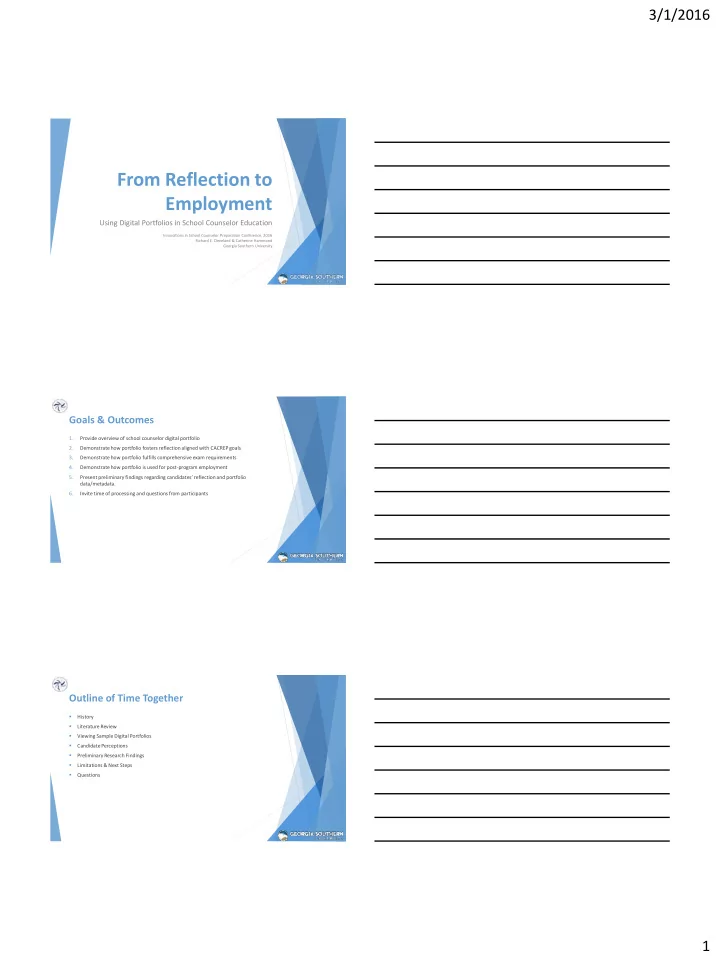

3/1/2016 From Reflection to Employment Using Digital Portfolios in School Counselor Education Innovations in School Counselor Preparation Conference, 2016 Richard E. Cleveland & Catherine Hammond Georgia Southern University Goals & Outcomes 1. Provide overview of school counselor digital portfolio 2. Demonstrate how portfolio fosters reflection aligned with CACREP goals 3. Demonstrate how portfolio fulfills comprehensive exam requirements 4. Demonstrate how portfolio is used for post-program employment 5. Present preliminary findings regarding candidates’ reflection and portfolio data/metadata. 6. Invite time of processing and questions from participants Outline of Time Together History Literature Review Viewing Sample Digital Portfolios Candidate Perceptions Preliminary Research Findings Limitations & Next Steps Questions 1
3/1/2016 History: What led to trying this out? Program Re-Boot Year 1: COUN7334 Group Dynamics course prep: Inconsistency + Laziness = Digital Format Year 2: Discussions of replacing Comp with Portfolio requirement Scholarship of Teaching & Learning (SoTL) Research Fellowship Monies funding programmatic, pedagogy, assessment, etc. focused research Replacing static (email) digital reflections with more dynamic (blog) format Doc Student Adjunct Experience EDU2200 “mop up” course setting up tech to satisfy edTPA reflection requirements Reflection Breadth, Depth, & Evolution Replacing physical binders with tech (e.g., links, URL, QR codes, etc.) Definitional Matters What do you mean “ Reflection ”? Self-Awareness vs. Self-Reflection Pre-, Quasi-, and Reflective Thinking Process Reflectivity Deep Processing / Semantic Processing Reflection- on -Action vs. Reflection- in -Action Metacognition Reflective Practice Diffraction Reflective Thinking Mindfulness Literature Review Education Dewey (1933;1938); Denton (2011; 2012); Kohlberg (1981); Kolb (1984); Mayes (2011); Schon (1983; 1987) Stepping Stone Creativity (Bell, Limberg, Jacobson, & Super, 2014) Experiential Learning (EL) (Association for Experiential Education, 2013) Intentionality (Gersten, Mears, Baldwin, Roberts, Gaertner, & Bartley, 2013) Professional Maturation & Anti-Burnout Guiffrida (2005); Orchowski, Evangelista, & Probst (2010) 2
3/1/2016 Literature Review Counselor Preparation Bell, Limberg, Jacobson, & Super (2014); Corey, Corey, & Callanan (1993); Erford (2015); Fong, Borders, Ethington, & Pitts (1997); Griffith, & Frieden (2000); Guiffrida (2005); McAuliffe & Eriksen (2011); Nelson & Neufeldt (1998); Rogers (1957); Thompson (2012); Young (2009) Accreditation & Best Practices ACA (2014); ACES (2011); CACREP (2009;2015); CAEP/NCATE (2015) Literature Review Use of Journaling Bohecker, Wathen, Wells, Salazar, & Vereen (2014); Griffith & Frieden (2000); House & Sears (2002) Guided Reflection Bell, Limberg, Jacobson, & Super (2014); Orchowski, Evangelista, & Probst (2010) Course Texts Corey, Corey, & Corey (2014); Sink, Edwards, & Eppler (2012) Literature Review: Inspirational Quotes “The rigorous process of graduate school may lead to greater self -discipline and ‘follow the rules’ thinking versus creative thinking.” (Bell, Limberg, Jacobson, & Super, 2014) “The reasons counselors do what they do are distinct from how they do it. […] It is possible that counselors, particularly those in the early stages of training, will at times be lacking intentionality,…” (Gersten, Mears, Baldwin, Roberts, Gaertner, & Bartley, 2013) “Although professionals in the field of education have acknowledged and studied the importance of reflection, counselor education has not taken advantage of this powerful teaching tool. Research that focuses on counselor education is needed (by educators) to know the most effective ways to educate reflective practitioners.” (Griffith & Frieden, 2000) 3
3/1/2016 Tenets of a Working Definition Intentional Habit Not confined to the past tense Active & ongoing Relational ontology of separateness (Keevers & Treleaven, 2011) Technology infused Viewing Sample Digital Portfolios COUN7334 Group Dynamics Portfolio Gus’ Digital Portfolio Template Reflection Guiding Rubric (Denton, 2012) A. Main Point : Post clearly states main point/opinion of reflection B. Evidence : Post gives example or evidence of main point C. Connection : Post states connection between main point and evidence D. Reflection : Post answers “So what?”, describing how main point relates to group counseling and candidate as counselor E. Elements : Length of 250-400 words, and use of group counseling language/terms Graduate Student Perceptions Demonstrating a “finished” or near -finished candidate portfolio Candidate perceptions regarding: 1. The process of creating the digital portfolio 2. Using the digital portfolio for reflection 3. Thoughts/experiences using the digital portfolio for interviews 4
3/1/2016 Preliminary Research Findings 2 Sections taught Fall semester, 2015-16 Challenges retrieving data from adjunct teaching section B course (control) Approximately half of candidates rated successfully by one rater thus far ( n = 16) After snooping the data (normality), paired samples t test per replication Preliminary Research Findings Component Group M Change Sig. (2-tailed) A. Main Point Experimental .000 1.000 Control . 625 .011 B. Evidence Experimental .125 .351 Control . 500 .033 C. Connection Experimental - .125 .732 Control .000 1.000 D. Reflection Experimental .125 .785 Control - .143 .689 E. Elements Experimental - .375 .080 Control - .143 .356 Note . “ M Change” presents change in mean score from first to last posting. Values in bold Sig at p < .05 Limitations Where to begin… Small sample size Tension between guided/direction (i.e., rubric) and completely open Fidelity of control vs. experimental conditions Second course section instructor as adjunct faculty member Methodology? 5
3/1/2016 Next Steps: Program/Pedagogy Expanding digital portfolio from just one course (COUN7334 Group Dynamics) to use for reflections throughout course of study Expanding digital portfolio from just one MEd concentration (School Counseling) to all concentrations (i.e., CHMC, SAHE) Anchoring portfolio creation/implementation with a required foundational course that transcends concentration, and takes place first semester year 1 Next Steps: Research Continue data-entry Multiple raters Complete analyses Consideration of more appropriate/relevant methodologies for analyses beyond requirements for replication of the study (i.e., answering the question of unit of analyses for reflection posts vs. candidates) n = 113 or n = 16 Next Steps: Research 6
3/1/2016 Catherine Hammond MEd Candidate School Counseling Counselor MEd College of Education, Georgia Southern University (772)341.9554 ch07870@georgiasouthern.edu https://hammondschoolcounselor.wordpress.com Richard E. Cleveland, PhD Assistant Professor Program Coordinator, School Counseling Counselor MEd Leadership, Technology, & Human Development Dept. College of Education, Georgia Southern University (912)478.8022 rcleveland@georgiasouthern.edu @RichieKinz richardcleveland.me 7
Recommend
More recommend